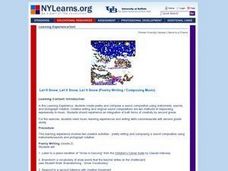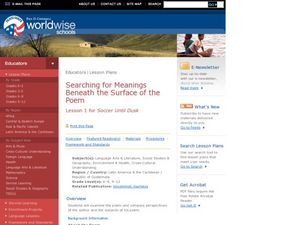National Council of Teachers of English
Writing Acrostic Poems with Thematically Related Texts in the Content Areas
Scholars scour thematically aligned texts to gather a bank of words they can use in an original acrostic poem.
Curated OER
Japanese Poetry: Tanka? You're Welcome!
Students explore tanka, a form of Japanese poetry. They read and analyze tankas to determine the structure and intent, and compose a traditional and a non-traditional tanka.
Curated OER
Poetry/Music: Let It Snow!
Students create poems and sound compositions using instruments, sounds, and pictograph notation. After listening Debussy's Children's corner suite, they brainstorm a list of snow vocabulary words. Students write poems and in groups...
Curated OER
Poetry Writing Unit: Writing a Film Poem
Film poems? To concluded a poetry unit, writers select one of their own poems and create a film that brings to life the sounds and images of their work. Included with the detailed unit plan are daily lessons, student examples, a list of...
Curated OER
Set a Poem to Music
Fun awaits both you and your class as you embark on a musical activity. After discussing different rhythmic meters they choose a poem to set to music. The poem must rhyme and be set to a melody in the key of C Major. Because the activity...
Pulitzer Center
"Voices from Haiti": Using Poetry to Speak up for a Cause
Explore a real world use of poetry with your class! Young language arts pupils consider the concept of advocacy and how journalism, photography, and poetry can raise awareness for a cause. They read several poems about individuals...
EngageNY
Gathering Evidence and Drafting a Two-Voice Poem (Chapter 13: "Los Duraznos/Peaches")
Begin class with a short comprehension quiz and review and then move into a new genre: two-voice poems. The activity provides information about this type of poetry as well as a video example made by eighth graders that you can show your...
Curated OER
Acoustic Poems
Students explore acrostic poems. In this interactive poetry lesson, students visit the ReadWriteThink.org website to view characteristics and samples of acrostic poems. Students develop acrostic poems by using the interactive site.
EngageNY
Writing, Critique, and Revising: Two-Voice Poems (Chapter 14: "Las Ucas/Grapes")
Continue work on the two-piece poem that compares two characters from Esperanza Rising. Give class members a few minutes to finish their drafts. After they have a complete product, model how to critique and edit the poems with one group....
National Council of Teachers of English
Writing Poetry with Rebus and Rhyme
Young scholars write rhyming poems using rebus. With pictures instead of words, authors create original work about things they love.
Curated OER
"Your Son, Your Only One" - The Sacrifice of Isaac as a Motif in Holocaust Poetry
Class groups examine a series of poems that use Abraham’s willingness to sacrifice Isaac as a motif in Holocaust poetry. Included are questions, notes to the teacher, and bibliographical information on each poem. The activities could be...
Curated OER
Searching for Meanings Beneath the Surface of the Poem
Students examine poems from Latin America and the Caribbean. They compare different perspectives and subjects in the poems. They research Peace Corps volunteers as well.
National Endowment for the Humanities
Poems that Tell a Story: Narrative and Persona in the Poetry of Robert Frost
Dig in deeper with Robert Frost's, "Stopping by Woods on a Snowy Evening." Learners will read and discuss poems by Robert Frost and learn the meaning of terms such as narrative and personal. They journal, collaborate, and present poetry...
Curated OER
Poetry Workshop: Fixed Form Poems
Encourage the poetic genius in your young creative writers with a poetry workshop. Fix form poems (cinquains acrostic poems, octopoems, hello/goodbye poems) provide a framework and encourage vocabulary development as well as an awareness...
Academy of American Poets
Poems about Poetry
Learners of all ages hear the words “Today we’re going to start poetry” and begin their plans to drop out of school. It is not the teacher's fault! Use this resource to help young scholars understand the genre of poetry and why it is...
Academy of American Poets
Teach This Poem: "The Tradition" by Jericho Brown
To begin this activity, class members examine Antonius Hockelmann's painting "Tree Flowers II," record elements of the painting that they notice, and share their observations with a partner. Next, pupils do a close reading of Jericho...
ReadWriteThink
What is Poetry? Contrasting Poetry and Prose
Introduce middle schoolers to the different strategies used when reading prose versus poetry. Groups use a Venn diagram and a poetry analysis handout to compare the characteristics of an informational text and a poem on the same subject...
Arts Midwest
The Stories and Poems of Edgar Allan Poe: Biographical Criticism and the Speaker of a Poem
Author's are often influenced by events in their own lives as they write. Use Edgar Allan Poe's poems "Ulalume" and "Annabel Lee" to take a look at how the death of Poe's wife affected his poetry. Ask students to discuss and compare the...
Academy of American Poets
Teach This Poem: "Spring is like a perhaps hand" by E. E. Cummings
E. E. Cummings' "Spring is like a perhaps hand" offers young scholars an opportunity to try their hands at analyzing a simile. After a warm-up activity and a close reading of the poem, class members discuss what they think the poem is...
Academy of American Poets
Teach This Poem: "Tamales on Christmas" by Christian Robinson
A lesson spotlights the poem "Tamales on Christmas" by Christian Robinson. Scholars discuss their favorite foods and then examine a lively picture of a family preparing tamales. After listening to the poem twice, learners participate in...
Academy of American Poets
Teach This Poem: "The Metier of Blossoming" by Denise Levertov
Poetry analysis need not be a lugubrious exercise for young learners. The approach used with Denise Levertov's poem, "The Metier of Blossoming" is one of close observation, of noticing and reflecting on the words, phrases, and images the...
Pixton Comics Inc.
Elements of an Epic
Mythic heroes, gods and goddesses, and epic tales come alive as young artists craft their own graphic novel or mind map for classic epics, including The Odyssey, Beowulf, Harry Potter, and Star Wars, identifying the six elements of every...
Academy of American Poets
Teaching the Vietnam War with Poetry and Archives
The language of and the perspective of photographs, poems, and official reports differ. After a close reading of two photographs, two poems, and a military report about the Vietnam War, individuals adopt someone's voice or something from...
PBS
Discuss 22-year-old Amanda Gorman’s inaugural poem “The Hill We Climb”
Two poems by National Youth Poet Laureate Amanda Gorman are spotlighted in a PBS lesson. Young scholars conduct a close reading and watch videos of Gorman reading her inaugural poem "The Hill We Climb" and "The Miracle of Morning." They...
Other popular searches
- Poetry Analysis
- Poetry Alliteration Examples
- Poetry Alliteration
- Writing Poetry
- Concrete Poetry
- Poetry Unit
- Introduction to Poetry
- Poetry Lesson Plans
- African American Poetry
- Figurative Language Poetry
- Free Verse Poetry
- 6th Grade Poetry Unit

























